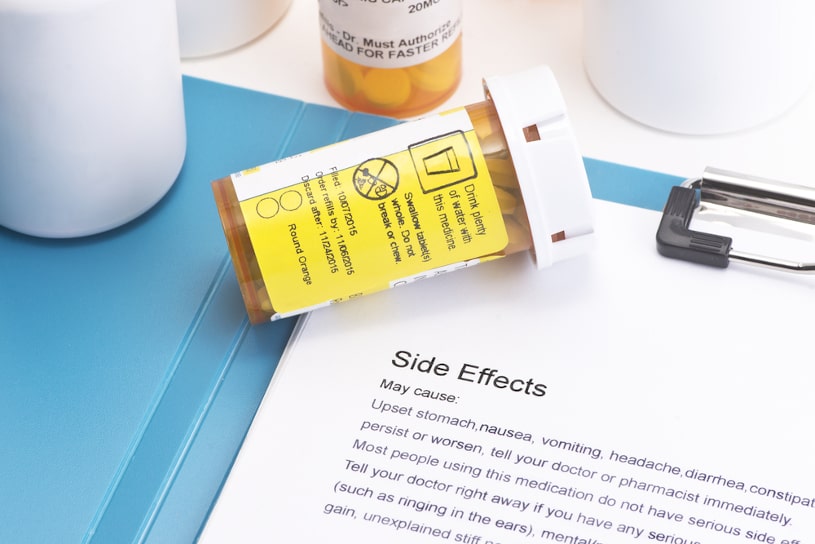Zoloft (Sertraline) belongs to the antidepressant class of drugs called selective serotonin reuptake inhibitors (SSRIs). This drug works by accumulating serotonin in neurons’ synaptic clefts, leading to increased neuronal activity and subsequent improvement in mood. SSRI drugs produce mood elevation and brain stimulatory effects.
Table Of Contents:
- What Are The Side Effects of Sertraline?
- What Are Short-Term Side Effects of Zoloft?
- Can Zoloft Decrease Sex Drive?
- What Are Severe Sertraline Long-Term Syndromes?
- Can Zoloft Result in Special Side Effects In Children?
- Are There Any Side Effects of Using Zoloft During Pregnancy?
- Why Does Sertraline Cause Side Effects?

SSRI drugs like Zoloft are likely to produce many adverse disorders that can range in severity. These can also include severe sexual problems for both men and women. There is also an increased risk of taking this medicine during pregnancy, as it can cause congenital birth defects and other serious problems in the fetus. Read along further to find out about all Zoloft side effects, including its short-term and long-term disorders.
What Are Zoloft Side Effects?
Zoloft, that is primarily used to treat depression, OCD, anxiety disorders, PTSD, and other similar conditions can cause several side effects.
Some of these side effects are listed below:
- Headache
- Nausea
- Diarrhea
- Constipation
- Fatigue
- Insomnia
- Weight loss
- Weight gain
- Dyspepsia
- Dizziness
- Increased sweating
- Drowsiness
- Tremors
- Paresthesia
- Anorexia
- Flu-like symptoms
- Decreased libido
- Delayed ejaculation
- Impotence
- Abdominal pain
- Agitation
- Vomiting
- Muscle cramps
- Delusions
- Hallucinations
- Back pain
- Amnesia
- Anxiety
- Hypouricemia
- Menstrual problems
- Restlessness
- Fever
- Malaise
- Dry mouth
- Urinary incontinence
- Aggression
- Seizures
- Anemia
- Suicidal thoughts
- Breast pain
- Back pain
Some of the above-mentioned effects may be caused after the drug’s short-term use ,while others may be caused after its long-term use. These are further discussed in detail in the following sections.
Short-Term Side Effects of Zoloft
There are several common side effects of the drug that can be classified into the following groups:
Gastrointestinal Adverse Effects
Serotonin is found in the digestive system, blood platelets, and the central nervous system. However, almost 90% of this neurotransmitter is present in the digestive system through which it can be inferred that the side effects of Zoloft can include many gastrointestinal problems.
Some of gastrointestinal problems are listed below:
- Abdominal Pain – This is usually caused as a result of serotonin-mediated modulation of gut motility and enzyme secretion.
- Constipation – Since Serotonin regulates both gastric emptying and colonic tone, it might, therefore, cause constipation by altering the amount of the neurotransmitter in the body.
- Diarrhea – Serotonin increases intestinal peristalsis and secretions. Thus, its increase caused by Sertraline might lead to diarrhea.
- Nausea – Nausea is caused when serotonin levels increase and stimulate the neurotransmitter receptors in the gastrointestinal tract.
- Dyspepsia – Serotonin’s effect on peristalsis in the esophagus can cause problems with swallowing.
- Dry mouth – The increased levels of serotonin increase the activity in the autonomic nervous system. This leads to dry mucous membranes that can cause dryness of the mouth and sometimes a sore throat.
Metabolic and Endocrine Symptoms
Serotonin affects various mechanisms that are involved in body energy control.
The metabolic and endocrine problems may be manifested in the form of:
- Increased appetite and weight gain – Serotonin plays a role in setting the body’s overall metabolic rate. It may also lead to an increase in appetite and consequent Zoloft weight gain.
- Weight loss – Weight loss may occur when the increased levels of the neurotransmitter lead to a loss of the body’s adipose tissue.
- Increased risk of bone fracturing – Excess of the neurotransmitter causes a reduction in bone mass. Hence, administering high doses of sertraline may predispose one to frequent bone fractures.
- Excessive sweating and/or night sweats – By interfering with the actions of the hypothalamic-pituitary-adrenal axis, increased serotonin levels may alter numerous processes in the body. A common manifestation of this effect is excessive sweating. Night sweats are thus common in people taking this drug.
Nervous System Disorders
Some of the sertraline adverse reactions that could affect the nervous system are listed below:
- Tremors – This medicine stimulates the nerve receptors for serotonin in the brain stream that can cause tremors.
- Dizziness – Taking this medicine may lead to a dangerous spike in the amount of the neurotransmitter that can cause the serotonin syndrome resulting in dizziness and, on rare occasions, coma and convulsions.
- Lethargy – This is usually caused by the effect of the drug on neurotransmitters such as acetylcholine.
- Headache – Headaches can be caused by excessive accumulation of the neurotransmitter.
- Muscle spasms and movement disorders, e.g., hyperkinesia – These may occur due to the drug’s influence on the brain’s motor activity.
Behavioral Zoloft Side Effects
This medicine’s modulation of various behavioral centers in the brain may culminate in diverse behavioral outcomes.
Some of the behavioral adverse reactions of Sertraline may include the following:
- Sleep disturbances – This drug may lead to overstimulation of wakefulness centers of the brainstem. It may cause changes in a person’s sleep tendencies and cause insomnia. Zoloft may even lead to somnolence (excessive sleepiness).
- Agitation – Mood swings caused by excessive serotonin may cause agitation, anxiety, panic attacks, and paranoia.
- Memory loss – By acting on various receptors in the hippocampus, serotonin may affect learning and memory. Though quite rare, memory loss has been documented.
- Suicidal thoughts and actions – Excess serotonin may cause mood swings and depression leading to suicidal thoughts, as witnessed in some patients on this medication.
Can Zoloft cause hallucinations? Yes, hallucinations, feelings of euphoria, anxiety, nightmares, and psychosis are also potential behavioral Zoloft side effects.
Renal and Urinary Disorders
Serotonin’s modulation of the urinary system includes the regulation of contractions in the bladder and the external urinary sphincter.
Some renal disorders may appear as side effects of sertraline, such as:
- Enuresis (inability to control urination) or Urinary incontinence
- Urinary retention
Cardiovascular Problems
Some side effects of Zoloft include various cardiovascular problems. Serotonin regulates the heart-pump mechanism by affecting the activity of the sinus and AV nodes.
Taking medication that increases this neurotransmitter’s levels in the brain may, therefore, cause cardiac problems such as:
- Palpitations
- Bradycardia (a slower than normal heart rate)
- Tachycardia (a faster than normal heart rate)
- Torsades de Pointes (rapid and irregular tachycardia on the ECG)
- QT prolongation (the heart muscle taking longer than usual to recharge between beats)
Zoloft side effects alter the platelet functions leading to:
- Thrombocytopenia (low platelet count)
- Leukopenia (a low white blood cells count)
- Abnormal bleeding
- Frequent nosebleeds
- Purpura (blood spots or hemorrhages on the skin)
- Vaginal bleeding, etc.
Serotonin’s influence on vascular dilatation and constriction may be the basis for vascular problems such as:
- Peripheral Ischemia due to vasoconstriction
- Hot flashes due to vasodilation
Can Zoloft Decrease Sex Drive?
Sexual dysfunction is a common side effect when taking SSRIs. It can have a significant impact on a person’s quality of life, relationships, mental health, and recovery. This drug, just like other SSRI medications, causes sexual problems due to its mechanism of action. SSRIs drugs raise the body’s serotonin levels, thereby making the user feel calm and less anxious. This sense of calm and stability prevents the body’s sex hormones from transmitting to the brain, thereby hampering sex drive drastically.
Possible Sertraline sexual side effects include:
- A decrease in sexual desire and excitement
- Delayed or diminished orgasm
- Painful ejaculation
- Penile anesthesia
- Loss of sensation in the vagina and nipples
- Persistent genital arousal
- Non-puerperal lactation in women among others
According to an NCBI study, a prevalence of SSRI sexual dysfunction ranges approximately between 5%-10%, with few presenting with delayed orgasm and erectile dysfunction. The study also claims that SSRI drugs have an approximate prevalence of 58%-70% men presenting with erectile dysfunction and abnormal ejaculation while females presented with delayed or absent orgasm.
Sexual Side Effects of Sertraline for Women
According to a Harvard Health Publishing study, 23% of women in the U.S. between the ages of 40 and 50 are on antidepressants.
The common Zoloft sexual side effects in women can include the following:
- Non-puerperal lactation
- Engorgement of the clitoris
- Delay or absence of orgasm
- Unlubricated vagina
- Sexual discomfort
- General loss of sexual interest
Sertraline Sexual Side Effects for Men
The possible medication-induced sexual dysfunctions in men may include the following:
- Decreased libido
- Difficulty in maintaining an erection
- Delayed or blocked orgasm
- A drop in sperm count
Ways to Decrease Zoloft Sexual Side Effects
The first step in combating Zoloft sexual side effects is affirming that the sexual side effect is drug-induced. Thereafter, the following steps can be taken:
| Sr. No. | Action | Description |
|---|---|---|
| 1. | Adjust dosage | Although sexual problems of SSRIs and other antidepressants can occur at any dose, it is a good idea to talk to the doctor about decreasing the medicine’s dose. Reducing the dosage without talking to a doctor can be dangerous and should be avoided. A patient needs to be closely monitored for a couple of weeks after a dosage adjustment. Don’t try to increase sexual desire by combining alcohol with sertraline dose as it can cause serious outcomes. |
| 2. | Medication Timing | Taking medicine after sex can help to minimize the sexual problems associated with its use. |
| 3. | Sex schedule | The time of the day in which this drug’s adverse reactions are more pronounced vary. Ask a doctor when to take Zoloft to minimize its sexual adverse reactions. |
| 4. | Taking a Drug Holiday | The drug can be stopped for a few days before sex, depending on how long Zoloft stays in the body. This requires careful and conscious sex planning, and although it isn’t an automatic solution, it can work well when the doctor’s instructions about stopping and resuming it are followed correctly. |
| 5. | Reassessing prescription | If the sexual problems persist even after the sertraline dosage has been changed, the doctor may switch the brand of the medication that may cause fewer sexual problems. They might also be able to add another drug to the prescription, such as Viagra, for maintaining an erection in men and bupropion as an antidepressant aid in women. |
| 6. | Timeline | A straightforward solution for the adverse reactions of SSRIs is waiting it out. These problems might go on their own after a couple of weeks or months, depending on how an individual’s body adapts to them. It is a good idea to wait and see if sexual problems minimize or go away. Establishing a timeline is also essential after dosage change or if the patient has switched to a sertraline alternative. The doctor and patient must work together to determine if the symptoms improve or not. |
| 7. | Use lubricants | Sexual side effects, such as vaginal dryness, can be minimized by using a water-based lubricant. |
| 8. | Physical activity | Another great way to counter the sexual problems caused by this medicine is to exercise frequently, especially before sex. 20 minutes of exercise has been found to have a positive impact on sexual function and libido. |
| 9. | Talking about it | A lot of individuals find the sexual disorders of antidepressants agonizing. This can cause them to give up the medication with the hope of having better sex lives. Weaning off Zoloft without medical support can cause serious withdrawal symptoms and may cause them to relapse. This will likely lead to more problems such as poor quality of life and mood swings. It is necessary to discuss with a sexual partner as well as the doctor about such drug sexual dysfunctions. This will help in deciding on a course of action that will not hurt both parties’ mental health. |
Severe Long-Term Syndromes Associated with Zoloft
There are certain severe conditions associated with the long-term use of this drug are discussed below:
Serotonin Syndrome
Serotonin Syndrome is a condition that may occur in patients after long-term use of this medicine. Its presentation varies in severity from mild, barely-perceptible signs to very severe, life-threatening symptoms. The condition can also be caused by combining sertraline and marijuana.
Serotonin syndrome occurs due to the excessive neurotransmitter in the body, which causes autonomic instability, altered mental status, and neuromuscular dysfunction.
Symptoms of serotonin toxicity may include the following:
- Confusion
- Agitation
- Delirium
- Hypertension
- Tachycardia
- Flushing
- Vomiting
- Diarrhea
- Tremor
- Neck pain
- Convulsion
Severe serotonin syndrome may cause:
- Acute kidney injury
- Acute liver failure
- Metabolic acidosis
- Diffuse intravascular coagulation
- Coma
Serotonin Discontinuation Syndrome
If a person has been on Zoloft therapy for a long time, its discontinuation might cause withdrawal symptoms, especially if it is done abruptly.
The discontinuation symptoms may include the following:
- Headache
- Muscle aches
- Malaise
- Nausea
- Chills
- Flu-like symptoms
- Paresthesia (feeling of pins and needles in hands and feet)
- Electric-shock-like sensations
- Agitation
- Anxiety
- Insomnia.
Hypersensitivity
Developing an allergic reaction to Sertraline is also possible. Although rare, severe hypersensitivity may cause anaphylactic reactions and shock.
Special Adverse Effects of Sertraline In Children
Sertraline is usually prescribed to children suffering from obsessive-compulsive disorder (OCD), attention deficit hyperactivity disorder (ADHD), depression, and mood swings.
Antidepressant therapy using this medicine should be closely monitored in children and teenagers. About 1 in 50 children adopt suicidal tendencies when on SSRI treatment. Zoloft side effects, such as depression, may also worsen in children.
Some of the common side effects of Sertraline in children include the following:
- Indigestion
- Stomach ache
- Nausea
- Vomiting
- Diarrhea
- Constipation
- Urinary incontinence and enuresis
- Headaches
- Difficulty sleeping
- Nightmares
- Body coordination problems
- Loss of appetite
- Difficulty swallowing
- Feeling elevated or too happy
Apart from the above-mentioned symptoms, there could be some serious Zoloft side effects in children.
Contact a doctor or healthcare professional if the child feels any of the following symptoms:
- Confusion or agitation
- Fever above 38 C.
- An allergic reaction such as swelling of the eyes, lips, or face, rash, irritation, or redness of the skin.
- Seizures
- Hallucinations
- Disorientation
- Suicidal thoughts and actions.
Zoloft and Pregnancy: Adverse Reactions of Using This Medicine During Pregnancy
Though various doctors claim that several antidepressants, particularly the SSRIs, are mostly safe for usage, there is an increased risk of developing congenital disabilities and other complications when taken during pregnancy.
Zoloft has been graded as a class “C” category drug by the U.S Food and Drug Administration. This means that it has the ability to cause significant harm to the fetus when tested on animals. Its use during pregnancy can also cause severe lung problems and other complications in the baby.
A study conducted on more than 2000 pregnant women taking this medicine showed a link between the antidepressant and a 3% to 5% elevated risk of developing birth defects.
Zoloft side effects in pregnancy can manifest in forms of some common symptoms that are listed below:
- Nausea
- Headaches
- Decreased Libido
- Gastrointestinal issues
- Weight gain or loss
- Irritation or anxiety
- Lethargy
- Blurred vision
- Manic episodes
- Memory problems
- Confusion
- Weakness
- Mood Swings
- Sleeping problems
The following is a list of the possible issues experienced by infants whose mothers have taken this drug for prolonged periods during pregnancy:
- Respiratory issues
- Breathing difficulties
- Seizures
- Cyanosis
- Feeding difficulties
- Tremors
- Jitteriness
- Temperature fluctuations
- Apnea
- Hypoglycemia
- Hypertonia
- Vomiting
- Hypotonia
- Tremors
- Hyperreflexia
Birth Defects Associated with Zoloft
The packaging of this medicine contains a warning label that states the use of this drug during pregnancy increases the chances of birth defects in pregnant women. Fetuses that have been exposed to the drug late in the third trimester have experienced severe complications requiring hospitalization.
A Sertraline Birth Defect study indicated an increase in the incidences of congenital disabilities caused by the prolonged consumption of the drug in pregnant women.
In another study, the use of this drug during the first trimester of pregnancy was associated with an increased risk of cardiovascular-related malformations, including atrial and/or septal defects in infants.
Taking this drug during pregnancy can increase the risk of the fetus developing the following birth defects:
- Septal Heart Defect
- Omphaloceles
- Craniosynostosis
- Autism
- Tetralogy of Fallot
- Respiratory problems
- Spina Bifida
- Clubfeet
- Cleft lip or palate
Is it Safe to Take Sertraline While Breastfeeding?
Sertraline is one of those SSRIs that are considered safe to be used during breastfeeding. Based on this research about the safety of this medicine during breastfeeding, it was established that little to no traces of the medicine get passed on in breast milk. However, there are some instances where it was shown that this drug might be passed in breast milk.
Usually, sertraline is started on a low dose during breastfeeding, and the infant is monitored for any problems such as irritability, sleep problems, or poor feeding. In the case of any adverse reaction, the doctor may lower the dose further or devise a schedule in which breastfeeding should be avoided at the times when the antidepressant milk concentration is at its peak.
Also, in case of any adverse reaction, one should not think about quitting sertraline medication without consulting a doctor as it can cause severe withdrawal symptoms and relapse. The doctor would weigh the benefits of continuing the medicine with the suspected problems on the infant before deciding whether to lower or stop the dosage.
Why Does Sertraline Cause Side Effects?
Sertraline works by blocking the reuptake of serotonin in the brain. This leads to increased amounts of serotonin in the brain that helps maintain mental health balance. On the other hand, this can also cause mood swings, eventually leading to worsening depression and anxiety. This causes most of the emotional, behavioral, and nervous system sertraline side effects.
The increased levels of serotonin in the brain can also cause serotonin syndrome that can cause a great number of problems.
One of the most important reasons to be cautious with sertraline is to avoid any overdose on Zoloft. Patients on sertraline medication are also advised to be on the lookout for possible treatment-emergent adverse reactions. The following are generally good practices to prevent the development or worsening of problems, as described in the Mayo Clinic article.
Depression can be quite tough to manage, and if left untreated, could lead to fatal circumstances. If someone is experiencing debilitating side effects and wants to discontinue it, it is very important to wean off Zoloft. Treatment should never be stopped abruptly as it can lead to dangerous withdrawal symptoms. Tapering off sertraline may take several weeks to avoid the development of Serotonin Discontinuation Syndrome.
To get appropriate care and treatment, it is recommended to find a professional rehab center that can help to get sertraline out of the system. A qualified rehab center can provide emotional support to alleviate suffering, along with support group therapy, to keep one engaged and help to manage Zoloft side effects. They offer a wealth of facilities, therapies, and amenities to help the patient achieve long-term recovery.
Page Sources
- Mehdi Sayyah, Kaveh Eslami, Shabnam AlaiShehni, Leila Kouti, “Cognitive Function before and during treatment with Selective Serotonin Reuptake Inhibitors in Patients with Depression or Obsessive-Compulsive Disorder,” 2016, https://www.ncbi.nlm.nih.gov/pmc/articles/PMC5002481/
- Maurizio Pompili, Gianluca Serafini, Marco Innamorati, Elisa Ambrosi, Gloria Giordano, Paolo Girardi, Roberto Tatarelli, and David Lester, “Antidepressants and Suicide Risk: A Comprehensive Overview,” 2010, https://www.ncbi.nlm.nih.gov/pmc/articles/PMC4034101/
- Agnes Higgins, Michael Nash, and Aileen M Lynch, “Antidepressant-associated Sexual Dysfunction: Impact, Effects, and Treatment,” 2010, https://www.ncbi.nlm.nih.gov/pmc/articles/PMC3108697/
- Peter Wehrwein, “Astounding Increase in Antidepressant Use by Americans,” 2011, https://www.health.harvard.edu/blog/astounding-increase-in-antidepressant-use-by-americans-201110203624
- Sura Alwan, Jennita Reefhuis, Sonja A Rasmussen, Richard S Olney, Jan M Friedman, “Use of SSRI in Pregnancy and the Risk of Birth Defects,” 2007, https://pubmed.ncbi.nlm.nih.gov/17596602/
- Anick Bérard, Jin-Ping Zhao, Odile Sheehy, “Sertraline Use During Pregnancy and the Risk of Major Malformations,” 2015, https://pubmed.ncbi.nlm.nih.gov/25637841/
- Zi‐Qi Shen, Shan‐Yan Gao, Shawn Xiang Li, Tie‐Ning Zhang, Cai‐Xia Liu, Hai‐Chen Lv, Yuan Zhang, Ting‐Ting Gong, Xin Xu, Chao Ji, Qi‐Jun Wu, and Da L, “Sertraline Use in the First Trimester and Risk of Congenital Anomalies,” 2016, https://www.ncbi.nlm.nih.gov/pmc/articles/PMC5346877/
- Alessandro Cuomo, Giuseppe Maina, Stephen M Neal, Graziella De Montis, Gianluca Rosso, Simona Scheggi, Bruno Beccarini Crescenzi, Simone Bolognesi, Arianna Goracci, Anna Coluccia, Fabio Ferretti, Andrea Fagiolini, “Using Sertraline in Postpartum and Breastfeeding: Balancing Risks and Benefits,” 2018, https://pubmed.ncbi.nlm.nih.gov/29927667/









